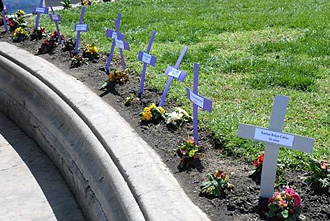 |
 |
 |
 Editorials | Issues | October 2007 Editorials | Issues | October 2007  
More Latinas Fight Domestic Violence
 Jack Chang - McClatchy Newspapers Jack Chang - McClatchy Newspapers
go to original


| | Crosses in Santiago, Chile, bear the names of victims of "femicide" — women killed by partners, husbands or boyfriends. There have been 48 so far this year in Chile. (Helen Hughes/Mcclatchy Newspapers) |
Rio De Janeiro, Brazil — Like many women she knows, Maria da Penha endured her husband's physical abuse for years, hoping he'd stop.

He didn't, and after repeated beatings and other mistreatment, her husband tried to kill her — twice. Da Penha decided to leave.

Putting him behind bars was another matter. During the next 20 years, da Penha won two convictions against her ex-husband for attempted homicide, but Brazilian courts nullified the first conviction and delayed making a final decision on the appeal of the second one.

"There was no policy for recognizing this kind of violence when this all started," da Penha, 62, said by telephone from her home in the northeastern Brazilian city of Fortaleza.

"I began this fight alone and I was showing my face in public, despite all the prejudice against battered women," she said.

No court took action until the retired pharmacist complained to an international panel that Brazil wasn't complying with a 1994 treaty on violence against women.

Many Latin American women continue to suffer silently under social norms that give men the unspoken right to hurt their spouses.

A 2003 Mexican government study found that nearly half of Mexican women or girls over the age of 15 had suffered some form of physical or emotional violence in their homes in the previous 12 months.

A poll in Chile found that half of the women in Santiago had been victims of similar abuse.

Brazil reported at least 160,000 cases of violence against women in 2005, with domestic violence making up the bulk of the attacks. Only 2 percent of domestic-violence cases in Brazil end with the imprisonment of the accused.

Attitudes toward such violence are changing, however, as more women rise to political power and governments take tougher stances.

Chile, Argentina and other countries have passed laws treating domestic violence as a unique offense and setting up special courts and support services for battered women.

The turning point for many was the treaty on violence against women that da Penha used against her government. Signed in 1994 by the members of the Organization of American States in Belem, Brazil, it remains the only international treaty that commits countries to fighting violence against women.

"But there's still a significant lag between the letter of the law and enforcement of the law," warned Viviana Krsticevic, the executive director of CEJIL, a U.S.-based human-rights group that focuses on the region.

Da Penha's struggle for justice began in 1983. Within four months, her husband shot her in the back while she slept, leaving her a paraplegic, then tried to electrocute her while she was in the shower.

But no court would send him to jail. When he finally served time, in 2002, the penalty seemed light. He spent two years of his 10-year sentence in prison, then was free on probation.

And that happened only after da Penha sought help from the Inter-American Commission, a judicial branch of the Organization of American States. She claimed the Brazilian government didn't prosecute her cases promptly and failed to prevent, investigate and punish violence against women.

The commission agreed in 2001, and the Brazilian government promised to toughen its laws and pay da Penha $20,000 in damages.

Violence against women, however, remains common in Latin America.

In Bolivia, male politicians regularly assault female elected officials who try to take office, said Maria Eugenia Rojas, who heads an association of Bolivian city councilwomen. Since 2000, the association has received 168 reports of such attacks.

The violence has risen as more Bolivian women win elected office.

Many Chileans have been alarmed this year by the wave of women who've been killed by their partners and by the failure of the country's new family court system to protect threatened women.

Last month, the husband of 25-year-old Katherine Casas-Cordero slit her throat in front of their two children in her home in Santiago, although the woman had repeatedly asked a family judge to issue a restraining order against him.

She was the 48th Chilean woman murdered by her husband or boyfriend this year. | 
 | |
 |



